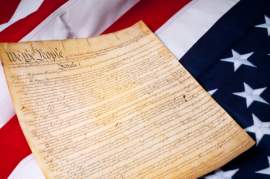
Major Decisions-Miranda v Arizona

Popular In Constitution
Purpose Of Lifetime Appointment And Pros And Cons Enumerated Powers Bicameral Legislature Background Article 3 Of The Constitution We The People 1st Amendment Who Wrote The Constitution Judicial Review Equal Protection Clause 5th Amendment 10th Amendment Three Fifths Compromise
The Miranda v. Arizona case is one that was considered to be as a result of the legal aid movement of the 1960s. The concept of the movement was to basically provide those accused of crimes with the legal support they required on their behalf. Among other Supreme Court decisions, Miranda v. Arizona was one of the most important cases to arise in United States history. Its final decision would essentially affect various levels of the United States Government, namely law enforcement. Furthermore, the final verdict would also become a championing effort for the Civil Rights Movement, as its coverage by the media was quite extensive and would become feted as a victory statement for citizen’s rights in the United States (See Also: Human Rights and Entitlements).
Miranda v. Arizona deals with several aspects of provisions set
forth by the United States Constitution and served to provide for an
application of Constitutional law that would be more visible among the civilian
populations of the country. The case of Miranda v. Arizona deals with a man
named Ernesto Miranda that was arrested for rape and kidnapping charges and
brought in for questioning and interrogation.
After hours of interrogation, Miranda would finally sign a written confession that also affirmed that he was made fully aware of his legal rights and had waived them voluntarily. However, Miranda was never made aware of his rights to an attorney or his right to remain silent prior to being interrogated. Miranda's defense motioned to have his written confession to be inadmissible in the courts as evidence. This would be overruled by the State courts, which would lead to an appeal to the Supreme Court.
The crux of the arguments for
Miranda's defense would lie in the fact that the law enforcement officials
would have violated the accused’s Fifth Amendment and Sixth Amendment rights, as well as failure to
comply with the Due Process Clause of the Fourteenth Amendment. The uproar over the Miranda v. Arizona
case is largely due to the Civil Rights Movement of the 1960s and the fact that
Amendments under the Bill of Rights of the Constitution were being
violated only added to its fervor and publicity.
The Supreme Court would hear the Miranda v. Arizona case under
Chief Justice Earl Warren, who eventually overruled the conviction and sentencing
of Miranda by the Arizona State courts. Warren would resolve that the
confession could not be considered admissible as evidence due to the fact that
it was in violation of the Fifth and Sixth Amendments of the Constitution.
Infringement of Fifth Amendment would be in relation to the self-incrimination clause, while the violation of the Sixth Amendment was in respects to the right to an attorney. Due to the interrogation tactics and practices of the involved law enforcement officials and the fact that Miranda was never made aware his rights to remain silent and to an attorney, the written confession as signed would be considered null due to such confession being, therefore, coerced or unlawfully forced.
Warren would conclude that any
person in custody subject to an interrogation must be fully aware of his rights
prior to any such interrogation taking place. Furthermore, the accused must
also fully understand those rights and the fact that he/she also has the right
to waive such rights.
The rendering of the decision of Miranda v. Arizona would then
become implemented into law, in which any person arrested for a crime must be
made aware of his rights to due process. The listing and verbal communication
from police to the suspect or accused would become known as Miranda Rights.
The rendering of this decision would also have further Constitutional implications in which other Supreme Court cases would try to use Miranda rights as precedence or oppose the ruling altogether, citing that such practice gives the opportunity for criminals to slip away from justice due to a provisional technicality. Furthermore, the ruling of Miranda v. Arizona also helped re-establish the importance of the Constitution's Bill of Rights as fundamental human and civil rights guaranteed to the people of the United States.
Warren's interpretation of the Constitution also helped strengthen the "loose interpretation" of the Constitution that had been implemented in other cases by John Marshall, such as Gibbons v. Ogden, another landmark Supreme Court case.
NEXT: Major Decisions-New Jersey v. T.L.O.





















